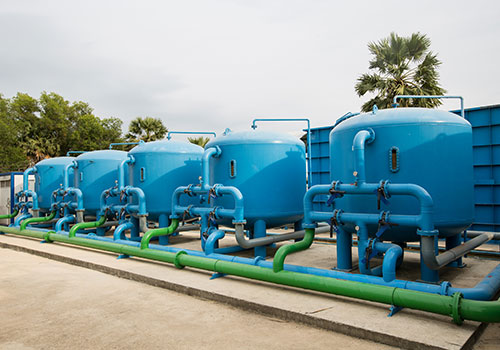What are the uses and Benefits of Water Softener Plant in Industries?
Water Softener Plant Manufacturers

What is Water Softener Plant?
A Softener Plant, also known as a water softening system, is designed to remove the calcium and magnesium ions from hard water, effectively “softening” it. The primary mechanism used for this purpose is a process called ion exchange. Here’s how it works:
How does a Water Softener Plant Works?
- Resin Tank: The core of a softener plant is a resin tank filled with tiny, negatively charged resin beads, typically made of polystyrene or a similar material. These beads are coated with positively charged sodium ions.
- Ion Exchange: As hard water flows through the resin tank, the calcium and magnesium ions in the water are attracted to the negatively charged resin beads. In exchange for these mineral ions, sodium ions are released from the resin beads into the water.
- Softened Water: The water that exits the resin tank is now “softened” because the calcium and magnesium ions have been removed and replaced with sodium ions. This water is free from the scaling properties of hard water.
- Regeneration: Over time, the resin beads become saturated with calcium and magnesium ions and need to be regenerated. This is achieved by rinsing the resin tank with a concentrated saltwater solution, which restores the resin beads’ ability to exchange sodium ions for calcium and magnesium ions.
Industries uses Water Softener Plant
- Food and Beverage Industry: Water softening is crucial in food and beverage processing to prevent scale buildup in boilers, steamers, and other equipment. It also improves the taste and appearance of products like coffee and beverages.
- Hospitality and Lodging: Hotels, resorts, and restaurants use water softeners to provide guests with softened water for bathing, laundry, and dishwashing. Softened water enhances the quality of service and reduces maintenance costs.
- Textile Industry: Textile manufacturers use soft water in dyeing and washing processes to prevent fabric discoloration and improve the efficiency of laundry operations.
- Laundry Services: Commercial laundry services, such as those in hotels, hospitals, and dry cleaners, rely on water softeners to maintain the quality of linens and fabrics while reducing detergent consumption.
- Hospitals and Healthcare Facilities: Water softeners are essential in healthcare facilities to prevent scale buildup in sterilization equipment and to ensure that medical devices and instruments are adequately cleaned and sanitized.
- Pharmaceutical Industry: The pharmaceutical sector uses softened water for various purposes, including ingredient preparation, equipment cleaning, and steam generation to meet strict purity standards.
- Manufacturing and Industrial Processes: Many manufacturing industries, including automotive, aerospace, and electronics, use softened water to prevent scale buildup in cooling systems, machinery, and manufacturing equipment.
- Boiler and Cooling Tower Operations: Softened water is essential in maintaining the efficiency of boilers and cooling towers in power plants, refineries, and industrial facilities.
- HVAC Systems: Heating, ventilation, and air conditioning (HVAC) systems in commercial buildings benefit from softened water to prevent scale deposits in heat exchangers and cooling coils.
- Aquariums and Zoos: Softened water is used to create and maintain ideal water conditions for aquatic life in aquariums and zoo exhibits.
- Automotive Industry: Car wash facilities and automotive manufacturers use water softeners to prevent water spots and scale deposits on vehicles and equipment.
- Greenhouses and Agriculture: Water softening may be employed in agricultural settings to prevent clogging in irrigation systems and to improve the effectiveness of fertilizers and pesticides.
- Residential Use: Apart from industrial applications, residential water softeners are commonly used in households to improve water quality for bathing, cleaning, and extending the life of plumbing fixtures and appliances.
Benefits of Softener Plants
- Scale Prevention: Softener plants effectively prevent scale buildup in appliances, pipes, and fixtures, extending their lifespan and reducing maintenance costs.
- Improved Cleaning: Softened water enhances the effectiveness of soaps and detergents, leading to better lathering and cleaner dishes, clothes, and surfaces.
- Skin and Hair Care: Softened water is gentler on the skin and hair, reducing dryness and irritation.
- Cost Savings: Reduced energy consumption and longer appliance lifespan translate into cost savings over time.
Conclusion
Softener plants are the unsung heroes of water treatment systems, working quietly to ensure that every drop of water we use is free from the challenges posed by hard water. Whether in our homes, commercial establishments, or industrial processes, these systems provide water that not only tastes better but also performs better, saving both money and resources. Softener plants are a testament to the innovative solutions that ensure we have access to quality water, a vital resource in our daily lives.
Best Water Softener Plant Manufacturer in India
Unistar Aquatech Private LImited is a leading Water Softener Plants Manufacturer in India. With a commitment to excellence and a reputation for quality, Unistar Aquatech has established itself as a trusted name in the water treatment industry.
Our Water Softener Plants are designed to cater to the diverse needs of residential, commercial, and industrial clients across India. We understand the challenges posed by hard water and the importance of ensuring that water quality meets specific standards.
Choose Unistar Aquatech as your trusted partner for all your Water Softener Plant needs in India, and experience the difference that our commitment to quality and customer satisfaction can make in improving your water quality and enhancing your overall quality of life.
For more info, Please Contact us!
